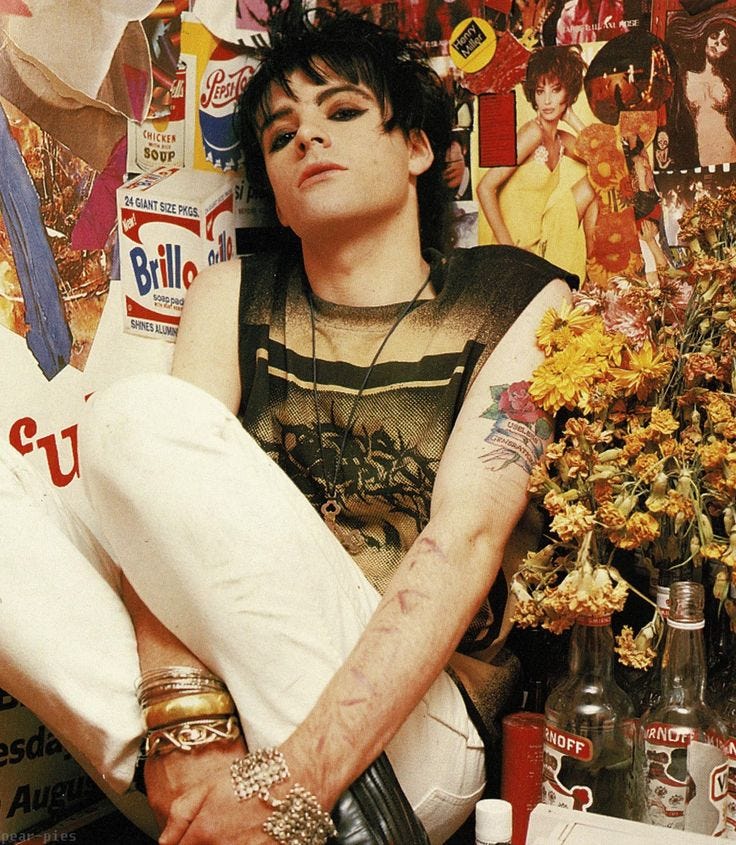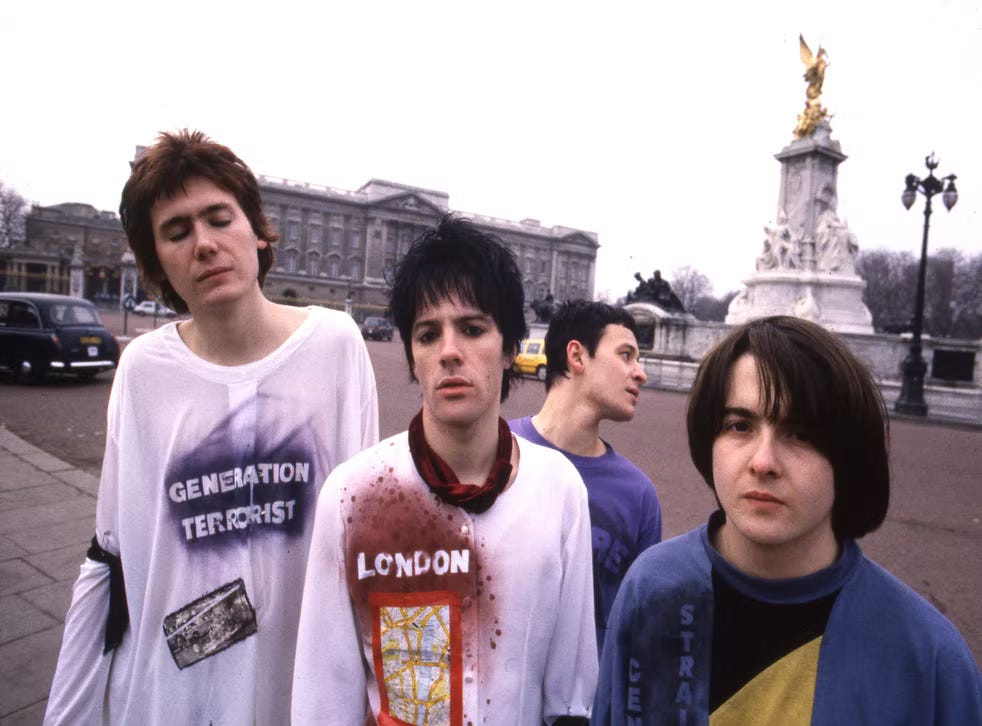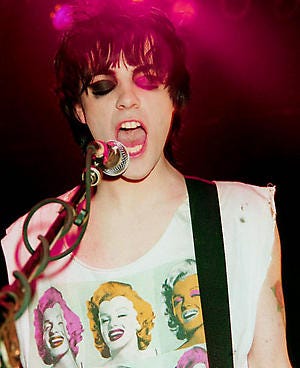From The Archives: Manic Street Preachers – Lovely Wreckage From UK Guttertrash Nihilists
"Thousands of body bags coming home, but a smashed guitar was offensive?!" Presenting the Welsh rockers' first US press encounter, my 1991 conversation with Richey Edwards for Alternative Press.
Richey Edwards, in the room he called me from that day in November 1991.
NOTE: In November 1991, Columbia Records’ Howard Wuelfing scheduled me to interview Manic Street Preachers for an Alternative Press profile, to coincide with the release of their debut album, Generation Terrorists. This was greatly exciting. I was an instant fan from the moment I noticed the rabid love/hate relationship English rock mags had with the Manics. Their indie singles were electrifying slabs of Clash-meets-Hanoi Rocks glam-punk, and their DIY self-styling – “a mess of eyeliner and spray paint,” ala the memorably self-mythologizing “Stay Beautiful” – was equally powerful. Their penchant for quoting some of my favorite authors on their record sleeves cemented it for me.
As the world began its love affair with Nirvana, I began mine with Manic Street Preachers. And I was about to become the first American journalist to interview them.
As his bandmates tracked Generation Terrorists in one room, Richey Edwards phoned me from the next that November 1991 morning, before I caught a bus downtown for my job at Quackenbush’s coffee house. We were close in age, I being older by two years. He’d also read several writers I had not by that stage of life, such as Camus. He was the most erudite, articulate rocker I’ve ever interviewed, alongside Iggy Pop.
This is a remix of the original article, from AP’s April 1992 edition. 25-year-old Tim made lots of word choices that make 57-year-old Tim cringe. I also looked at the original as an editor and wondered, “Well, why didn’t you write about this or that aspect of this band, numbnuts?” I was nowhere near the writer I thought I was then. Maybe I’m still not. But please allow an older gent the chance to lead the brat he was from outta his hubris for once. Maybe this will now be the article Manic Street Preachers deserved from their first US press encounter.
_________________________________________________
Manic Street Preachers 1991: (l-r) Nicky Wire, Richey Edwards, James Dean Bradfield, Sean Moore.
“The biggest disaster which probably happened in the ‘80s was The Smiths.”
Meet Richey Edwards, 23 years young. He plays guitar, writes lyrics, serves as spokesman, and carves his flesh for Manic Street Preachers. They’re here to save rock 'n' roll in a blaze of power chords, bloodshed, hero-worship, cosmetics, confusion, and naiveté. And the UK rock press hates them for it.
“The shadow of The Smiths is so enormous over this country,” Edwards continues, as his bandmates record their planned 2xLP debut album Generation Terrorists in the next room with Wham/Cult producer Steve Brown, at Guildford, Surrey’s Blackbarn Studios. The other Manics? James Dean Bradfield, lead guitarist/vocalist and crafter of all their music with his cousin, drummer Sean Moore. There's also Nicky Wire (née Jones), Minister of Four Strings, Leaps and Funny Faces. He does all the interviews with Edwards, who’s their Public Enemy-style Minister of Information and Art Director. So busy does this task keep Edwards, he hasn't the time to play guitar on the band's records; Bradfield handles all six-string duties on disc.
“I mean, the press talks about them as ‘the ultimate rock 'n' roll band!'” Edwards fumes on, still incensed at the idea of The Smiths. “And they’re just not. They're the most obscene thing we ever heard. When we first heard The Smiths, it was like, ‘This is just the saddest day of our lives, that this – the press' champion – is the future of rock ’n' roll.’ And then we realized that England is just the most fucked-up place.”
Intriguing, that the Manics’ face is so incensed at the idea of Morrissey and crew. No pre-MSP band encouraged their fans to obtain library cards more than The Smiths, who sold an awful lot of Oscar Wilde anthologies during their iron-grip reign on ‘80s indie Britain. By slathering the sleeves of such ferocious singles as “Motown Junk” and “You Love Us” with quotes from outlaw authors such as William S. Burroughs, the Manics have become a one-band literacy campaign with electric guitars and eyeliner. Perhaps Edwards’ disgust has to do with those Mancunians’ lack of what he considers rock ‘n’ roll?
Rock 'n' roll is virtually non-existent in 1992. Either you have some reptile with hair below his shoulder blades who's never heard of Prell, much less a guitar tuner, playing 20-year-old Tony Iommi SG riffs with considerably less finesse than Black Sabbath and calling it “art.” Or you have 25-years-too-late flower children playing acid-soaked heavy metal with a twinge of funk and calling it an “alternative.” Or, if you're unfortunate enough to inhabit the isle which gave the world boiled beef, you've got what Edwards likes to call “these fey lil' indie bands, ...like Wedding Present, all these gray, gray boring bands, fey lil' people staring at their own shoes."
Whatever happened to rock 'n’ roll? Whatever happened to amped-up boys leaping three-feet into the air, armed with Gibsons, possessing a dress sense which spells “cool” to The Kids and “Martian” to Everyone Else? Whatever happened to three chords and a middle-finger jabbed into the Universe's eye?
R’n’R was beginning to resemble a lost art, recently. Several of us holed up in our black leather cocoons with our Iggy Pop records. Then one day, l pawed through the English rock press, which is always good for a guffaw, considering they invent trends like Bagpipe Ska weekly in order to tear 'em down the next issue. But then some obviously deranged androgyne peered at me through his pancake and eyeliner, looking like a punk rock Bay City Roller decked out in a violet nightie, “SPECTATORS OF SUICIDE“ spray-stenciled across its face in some perverse tribute to Joe Strummer’s “White Riot" days. Offered for our inspection: His left forearm, the Princely slogan “4 Real” freshly carved into its surface, a red ooze washing out from the incisions.
Ed Sirs’ classic “4-REAL” shot of Richey Edwards for the NME.
“The thing is that everybody accepts the horrors that governments do,” says Edwards, eagerly explaining himself to a representative of the American rock press for the first time. “Yet they get really offended if there's like swearing on TV. That's a really fucked up set of values that we really wanna change.
“I mean, when the Gulf War was going on, people were coming back in body bags. And so many old people during this got really offended when we smashed up a Gibson onstage! We smashed a guitar! That was offensive to them! And yet they saw thousands of bodybags coming back, and they didn't give a fuck! But a smashed guitar was like a big deal!"
You'd think, in the wake of Pete Townshend's ritual splintering of Rickenbackers in the '60s, such a move would raise more yawns than ire. “It's because in the '80s over here, nobody was doing it, y'know? So, to all these journalists weaned on fey lil’ indie bands, we were just like the devil resurfaced.”
All four Manic Street Preachers grew up in each other's bedrooms in Blackwood, Wales, “a completely destroyed-like, post-industrial town where all the business is just gone.” Like many small town bedroom mirror pilots, the nascent Manics spent their time hooking down whatever culture their starved mitts clamped upon – heroic underground writers like Kerouac and Camus, bootleg Guns N’ Roses and Public Enemy videos and cassettes, ancient footage of the Sex Pistols and Clash on 1986 televisual punk retrospectives. They equally devoured the big three British rock weeklies: NME, Melody Maker and Sounds. As the lads faced said publications' Heroes Of The Week time and again, finding one and all lacking, they decided in the Grand Punk Tradition to take matters Into their own hands. If no band could offer what they were starved for – sex/style/subversion/Situationism/hedonism – then they’d become that band.
They cribbed from the Who, the Stones, New York Dolls, the Pistols, The Clash, Hanoi Rocks, GN'R, PE, the literary desperados they revered, and every tragic Old Hollywood starlet they ever adored. They moved to London, asked questions, pissed off the old, thrilled the young, raked their skin, played college balls and got booted out the front gates. They ended up resembling Johnny Thunders' Heartbreakers or the Dead Boys in the Dolls’ old make-up, clad in hand-me-downs from Mick Jones’ closet left from his London SS days.
And what about those records? The lyrics reflected a lifetime of A’s in English Literature classes, though sometimes forcing Bradfield to twist his mouth in odd shapes to accommodate occasionally oddly-scanning syllables: “Throw some acid on the Mona Lisa’s face/ Pollute your mineral water with a strychnine taste.” Bradfield also played far better guitar than most of the punk bands who inspired them. Every note they’ve recorded thus far’s embroidered in the sorta fiddly, articulate lead work that suggests Slash was a bigger influence than Steve Jones.
For their troubles, they sharply divided their once-beloved weeklies, making them readable fun for the first time since they lost their best writers, Nick Kent and Charles Shaar Murray. The Big Three couldn’t figure out if they loved or hated Manic Street Preachers. But they were such hilariously scabrous quote machines – “We will always hate Slowdive more than Hitler” – writers couldn’t stay away.
Still, what’s all this in “Motown Junk” about Holland/Dozier/Holland keeping the working classes under The Man's thumb via the composition of danceable love songs? Don't people need to dance? Don't they need to fall in love?
“I’ll admit our political stance is confused, that we're really fucking naive,” shrugs Edwards. “The thing is, in this country in the mid-'80s, there was a movement called Red Wedge, where they really tried to align any kind of political group with the Labour Party. And it was sooo gray and dogmatic and so useless, that every young person thought it was such a waste of time. It was just old men screaming out long, impossible words. It really turned us off. Whereas bands like Hanoi Rocks, who just looked so cool, we were much more Interested in them.
“So, we just wanted to have a very broad political consciousness without any kinda specific ideology. Now, the fact that we've got a lack of any specificity really gives us a lot more flexibility, I think. We're not based in any kinda camp, any party politics. We're much more a challenge to passive consumption. That's where our politics are. We just wanna sing about the new conditions and the passions that have come up since the war. Everybody's getting more and more obsessed with little things which are never gonna change their lives. Y'know, it's just sad. We wanna be at war with just passive spectators, I suppose.”
Five million bands before Manic Street Preachers attempted to save the world through rock 'n' roll. What makes them think that they will be the ones to finally succeed at it? “We're just gonna try, aren't we?” Edwards pleads, clearly frustrated with his interrogator’s Devil’s advocacy. “That's all we can do, really. It’s better than burying your head in the sand.”
Manic Street Preachers are such obvious dreamers, and are so publicly trying, it's a miracle their label Sony rewarded 'em with a worldwide record deal. It's even more miraculous when you take into account not one of the band's singles has graced the UK Top 40, nor has one of their gigs drawn more than 200 bodies tops. This band's truly a phenomenon existing mostly In the music press, blown out of proportion for the crimes of aping rebel rock forebears, making great rock singles, and being loudmouths. They've got Brown glossing enough of a commercial sheen over 'em to send "Stay Beautiful" upward bound, and their label’s granted them enough carte blanche to finance their biggest pipedream: That two-record debut LP, supported by an extended kamikaze mission into the American Jungles and selling 16 million copies. After which they promise to ride off into either the sunset or their folks' living rooms in Wales, where they'll spend the rest of their lives soaking up cathode rays and "Where are they now?" mentions.
It could happen, but not the way Manic Street Preachers envision it. Their romance-and-Babycham-soaked noggins haven't enough focus to see that a '90s hotrod update of vintage UK pogo-rock will never net 'em Guns N' Roses-style megastardom. The best they can hope for is to follow the Pistols and Dolls down their paths to Glorious Failure-hood. Which is fine: Those bands inspired two generations of garageband guerillas to pick up Gibsons and commence firing. Which is another necessary development to our—and rock's—continued survival. As necessary as their singles. As necessary as the way they shake up a few Happy Mondays fans with typewriters. At least they've got England screaming, again. At least they've proven somebody remembers real rock 'n' roll.
______________________________________
POSTSCRIPT: Generation Terrorists did not sell in those Appetite For Destruction-esque numbers Manic Street Preachers desired, despite a glossy American AOR production out of step with the new grunge orthodoxy. The original quartet cut two more LPs, the widescreen stadium balladeering of Gold Against The Soul and the abrasive art-punk depression diary The Holy Bible. I was contracted by Epic Records to write a bio for a planned US release for the latter album, based on interviews with Edwards and Bradfield to be conducted during a promotional visit to our shores in February 1995. Bradfield was the only Manic to get on the phone with me that day: “Richey got an ear infection and could not fly,” he claimed. One month later, the British music papers reported Edwards had gone missing. He never resurfaced, and was officially pronounced dead November 24, 2008. Post-Richey, Manic Street Preachers became one of the most successful bands in the world, via albums like Everything Must Go and This Is My Truth Tell Me Yours which hewed closer to the epic coliseum singalongs of Gold Against The Soul than their early glam-punk or The Holy Bible’s caustic post-punk. Only America remains impervious to the Manics’ charms. And their fans are still the most glamorous and literate in the universe.
Thanks to the Forever Delayed Manics fan forum for archiving the original article. Thanks to Howard Wuelfing for setting this up. And thank you, Richey Edwards, for all you did. If you’re still out there, I hope you find the peace you needed.
#timstegall #timnapalmstegall #timnapalmstegallsubstack #punkjournalism #manicstreetpreachers #firstamericanpress #alternativepress #1992 #richeyedwards #jamesdeanbradfield #nickywire #seanmoore #glampunk #motownjunk #youloveus #staybeautiful #generationterrorists #goldagainstthesoul #generationterrorists #subscribe #fivedollarmonthlysubscription #bestwaytosupport







Richey was indeed 23 years old in Nov 1991 (born Dec 1967).